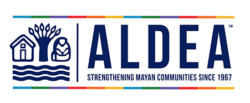
Located 11 miles from the municipal seat in the northern part of Tecpán, Xecoxol was founded around 1920 and is home to 415 families. The name “Xecoxol” means “under the elf’s house,” in the Kaqchikel language – an ancient legend says an elf guided people through the mountains and disappeared under a rock. About 80 percent of the families living there are Catholics and 20 percent are Evangelicals.
Agriculture is the main productive activity in Xecoxol, particularly corn and beans but also coffee and vegetables like broccoli, sweet peas, and French beans. Some men in the community work at larger farms for about $6 per day. The village has a health post offering basic medical services twice per week. Electric service reaches 90 percent of households, and public transportation is available consistently because they are near a main road. The roads in Xecoxol are mostly dirt, with only about 200 meters being paved, but they are passable all year.
Our Partnership:
Xecoxol has never received support from the government or other agencies for development initiatives. ALDEA and ABPD began working with 40 Xecoxol families in July 2018 that completed our integrated program in May 2020. ALDEA and ABPD began working with a second cohort of 53 Xecoxol families in May of 2021 that completed our integrated program in May 2023. Click here to learn more about how we work with our partner communities and visit our blog to stay up to date with the latest developments on the ground in Guatemala!
